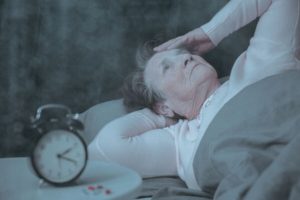Older adults who live and sleep alone may have a serious health condition and not know it. Sleep apnea is a constriction of the upper airway that occurs during sleep when the throat muscles relax. Sleepers are seldom aware of their loud snoring, gasping for breath, episodes of breathing cessation, and reduced cognitive functioning until someone observes them sleeping. Seniors without a live-in housemate or elderly care providers may have nobody to stop, look, and listen to them while they are dreaming.

Over time, the effects of untreated sleep apnea can be deadly serious. The waking symptoms of sleep apnea are common conditions, such as fatigue during the day, dry mouth, and morning headaches, easily attributed to other problems and rarely taken as indications of a life-threatening situation. Alert to these dangers, elderly care agencies can warn families to find out if their loved ones have symptoms of sleep apnea.
Signs to Look Out For
A simple checklist may help senior caregivers and the children of elderly parents to identify risk factors for sleep apnea. Older men and elderly women who are overweight and suffer from hypertension, cardiovascular and lung diseases, who complain of tiredness, forgetfulness, or confusion, and who regularly take daytime naps should be asked about the quantity and quality of their nighttime sleep. Adult children and elderly care providers can also ask senior family members if their parents or other relatives snored.
Do Mom and Dad snore? Adult children may already know the answer, even if their parents do not. If the “yes” responses to the checklist trend toward “yes,” the elderly parents should be invited to discuss their symptoms with their primary care physician. If the parents resist, the adult children should tell their family physician about their elder’s risk factors.
The doctor will likely order a sleep study. In years past, sleep studies could only be conducted in a clinical setting, but now, take-home, plug-in devices can track sleep and waking, breathing and breath cessation well enough to justify further study.
Treatment
Treatment for sleep apnea seldom requires drug treatment or surgery. Doctors often encourage overweight people with the condition to shed some pounds to lessen or eliminate symptoms. Patients with mild apnea are also advised to sleep on their side instead of their back. But those whose breathing is cut off for longer periods or whose gasps for air are more frequent are told to wear a mask-like appliance called a CPAP (continuous positive airway pressure) to keep their throat and airways open.
Some patients tolerate a CPAP well, and use the machine without complaint. Others find the thick mask, air tubes, and noisy machinery to intrude on restful sleep. There are no adequate alternatives to the CPAP at present, although manufacturers see a marketing advantage for those who develop lighter, less intrusive equipment. Advocates for a growing, better-educated, more tech-savvy elderly population are leading the way to lighter, more mobile, less expensive sleep apnea treatment.
Source: https://pubmed.ncbi.nlm.nih.gov/12795623/
